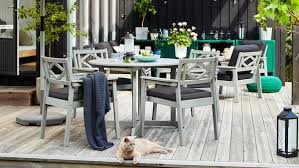What is the best wood to use for outdoor furniture? Cypress, redwood, and cedar are three softwoods that have natural moisture-wicking properties and make fine choices for outdoor furniture. But in our opinion, the best wood for outdoor furniture comes from top-of-the-line hardwoods such as ipe, mahogany, and teak.
Is teak furniture good in the desert? You may have known that teak is good for boats and fine furniture, but its stable factors make it a great wood to use in the desert heat. Teak’s natural rubber and oil content make it resistant to rot and termites.
What type of outdoor furniture is the most durable? Wrought Iron is one of the most durable and longest lasting type of outdoor furniture available, many times lasting decades. Truly an investment that keeps on giving, wrought iron furniture is also the heaviest frame.
Does acacia wood hold up in Arizona? In some extreme weather conditions acacia can eventually fade and crack. If you live in Arizona for example, where it’s extremely sunny and dry, I’d keep the wood oiled. That beating sun and heat can dry out and crack the wood over time. It’s a good idea to add in a little moisture.
What is the best wood to use for outdoor furniture? – Additional Questions
What material is best for outdoor furniture in Arizona?
HDPE Recycled Plastic (Poly)
Most poly lumber is treated with UV protectant so it can stand up to direct sunlight, making it ideal for Arizona and other desert climates. With the look and feel of real wood, poly lumber is a better choice for your Arizona backyard or patio.
Is teak or acacia better?
Ultimately, it depends on how you plan to use the wood. For indoor dining tables, coffee tables, end tables, and other indoor furnishings, acacia is the obvious winner. But if you need patio furnishings, you’re likely better off purchasing teak.
Do acacia trees grow in Phoenix?
Willow Acacia trees are a great desert tree for the Phoenix, AZ climate. These trees grow fast and upright to about 30 feet high. They are a low litter tree but are not deciduous.
Is Acacia wood water resistant?
At URBANARA, we opt to use acacia wood for many of our bathroom and kitchen collections because it is both highly durable and water-resistant – ideal for heavy-use items that are in frequent contact with liquids. It is claimed that even if acacia wood isn’t treated or protected in any way, it can last up to 40 years.
Is Acacia wood durable?
As the British Royal Navy has shown, Acacia has proven itself to be an extremely durable wood. Its density and hardness makes it the perfect material for heavy-use pieces such as dining tables and dining benches. When properly maintained, these pieces will last decades.
How do I protect my outdoor Acacia wood furniture?
Preserve the finish of acacia wood.
Similar to other hardwoods, acacia wood can hold paint or stain well. However, to protect the wood’s natural beauty, you can seal outdoor furniture with linseed or tung oil to bolden the appearance of the grain while also protecting the wood surface from sunlight damage.
What is the difference between teak and acacia wood?
The oil content in Acacia is much lower than in Teak and therefore would require some finishing work (as compared to Teak which has a natural finish because of the rich inherent oils). Teak (Tectona Grandis) is considered as the king of Timber. It’s rich oils and tight grain makes it naturally termite resistant.
Should acacia wood be oiled?
Even though acacia wood itself is quite resistant to fungus, tung oil increases the ability of the wood. You can avoid your acacia wood furniture from being damaged by the sun by applying a good coat of tung oil on it. It is one of the most water-resistant oils and protects the wood from being warped.
How long does acacia wood last outdoors?
Some of the trees are removed because they are a nuisance for other growing needs. Your outdoor patio furniture is an eco-friendly option that really is worth the investment because of this advantage. What is this? Most of the Acacia trees only live for about 20-30 years.
Is teak or acacia better for outdoor furniture?
Teak has the edge of being a more durable and weather-resistant material than acacia. This in turn results in teak wood being used in more higher-end patio furniture and having a higher price than acacia.
Can Acacia wood be left in sun?
If it’s in direct sunlight, yes. Still, you can protect your acacia wood to ensure it doesn’t fade in the sun. If you have an acacia wood deck or patio furniture, you’re probably wondering if it will fade in the sun. Keep in mind, it can definitely fade if left out in the element.
Do termites eat Acacia wood?
Small leaf Acacia wood is also termite resistant, so it is a good choice for use in areas where there is a risk of termite damage. In addition to its durability, small leaf Acacia wood is also a beautiful wood. It has a golden brown color that can darken over time to a rich, reddish-brown.
What do termites hate the most?
Termites hate sunlight. In fact, they can die from too much sunlight and heat exposure. If you suspect that a piece of furniture has termites, drag it to the yard to bake in the sun for a bit.
Which wood does not get termites?
The results showed that the heartwoods of rosewood and deodar were highly resistant to termite attack. The outer heartwoods of sal and toon proved to be resistant, but the inner heartwood of sal was only moderately resistant.
What can I spray on wood to keep termites away?
Pressure treated pine is one of the most common options. A chemical preservative containing insecticide is impeded within the wood through the use of pressure. Two of the chemicals used most often to treat wood are copper boron azole (CBA) and alkaline cooper quaternary (ACQ).
What kills termites naturally?
Borax powder, or sodium borate, can kill termites naturally. You just sprinkle the powder on the termites and the affected area, or you make a solution of the powder and water to spray or paint on affected areas. You can also paint the solution on surfaces as a termite repellant.
What kind of vinegar kills termites?
6. Exterminating Termites With White Vinegar. Another successful method for killing termites is the use of white vinegar. All you have to do is combine the juice of two lemons with a half cup of vinegar.




